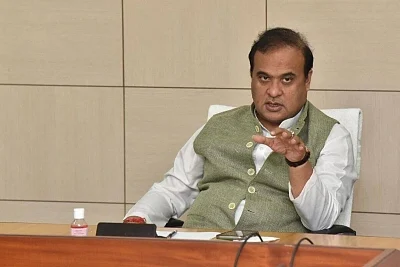Amid the recent calls for repeal of the Armed Forces Special Powers Act (AFSPA) in the north-eastern states following the horrific Oting massacre, Assam Chief Minister Himanta Biswa Sarma said that the state would see some 'rationalization' of the controversial law in 2022.
At a press conference in Guwahati on 2 January, Sarma said, according to news agency ANI:
"Assam will see some rationalization of AFSPA during the year 2022 as the Army has virtually withdrawn from Assam, leaving five-six districts. So it is a dynamic situation."
Sarma has previously refused to join in on calls for repeal of AFSPA, even as BJP leaders and allies in the region, including Nagaland Chief Minister Neiphiu Rio, had called for the end of the law after 14 civilians were killed on 4 December.
However, he had said even on 20 December that while the law would continue in the state, for now, the government could take a call on its partial or full repeal, if the law and order situation in the state remained peaceful.
At the press conference, Sarma confirmed that with AFSPA renewal coming up after four months, the Assam government would take "pragmatic decisions in consultation with the home department," ANI reported.
The Centre has formed a panel to look into the situation with AFSPA in Nagaland, and it will submit its report in 45 days, the Assam chief minister said.
The Nagaland Assembly unanimously passed a resolution demanding that the central government repeal AFSPA in Nagaland and the rest of the Northeast on 20 December. Meghalaya Chief Minister Conrad K Sangma also called for the repeal of the law in light of the Oting massacre.
What is AFSPA?
AFSPA, originally enacted in 1958, allows for the armed forces to be conferred with 'special powers', in any region designated as a 'disturbed area', either by the Centre or the Governor of a state or the Administrator of a Union Territory.
These special powers include opening fire and using force, even causing death, as well as making arrests and searches without warrants.
They are augmented under Section 6 of the Act, which grants the personnel involved in such operations immunity from prosecution without sanction.
Despite the calls for repeal in Nagaland, the Ministry of Home Affairs had ordered an extension of the notification of the state as a 'disturbed area' on 30 December.
Where is AFSPA in Force?
AFSPA covers all the northeastern states, even though it does not apply until a particular region is designated as a 'disturbed area'.
At present, all of Nagaland and Assam have been notified as such – as has all of Manipur except the Imphal municipal area – though Army presence in Assam is only in limited areas, according to Sarma.
In Arunachal Pradesh, the districts of Tirap, Changlang, and Longding, as well as the areas under the jurisdiction of the Namsai and Mahadevpur police stations (on the border of Assam) are currently notified as 'disturbed areas'.
The Act is not currently imposed in Mizoram, Tripura, and Meghalaya, all of which had been designated as 'disturbed areas' for long periods of time in the past.
A separate Armed Forces (Jammu and Kashmir) Special Powers Act, on the same lines as the AFSPA of 1958, was enacted by Parliament in 1990 which also remains in force. Another similar law was invoked in Punjab in 1983 and remained in force during the militancy years, before being repealed in 1997.
